
In a Nova Scotia research lab, the last hope for an ancient fish species
Racing against time, dwindling habitat and warming waters, scientists are trying to give this little-known...
The B.C. government was so excited to announce one of the province’s first independent power projects that former Energy Minister Jack Davis handed Ron Williams his contract in front of 400 applauding delegates at a conference at the Hotel Vancouver.
Williams, a small woodlot operator who lives near William’s Lake, remembers the day vividly: it was April 4, 1990, and he had driven down to attend the two-day conference sponsored by BC Hydro to promote independent power production.
From then on, Davis told Williams and 400 other delegates, “BC Hydro will canvass the private sector for power that can be generated below Hydro’s avoided cost.”
The contract gave Williams the security he needed to invest $320,000 to build a run of river project on a creek named Morehead, making use of a dam left by a gold mining operation a century earlier.
“It was just a small little spot where one could build a water turbine to generate electricity, just on a really, really small scale,” Williams tells The Narwhal.
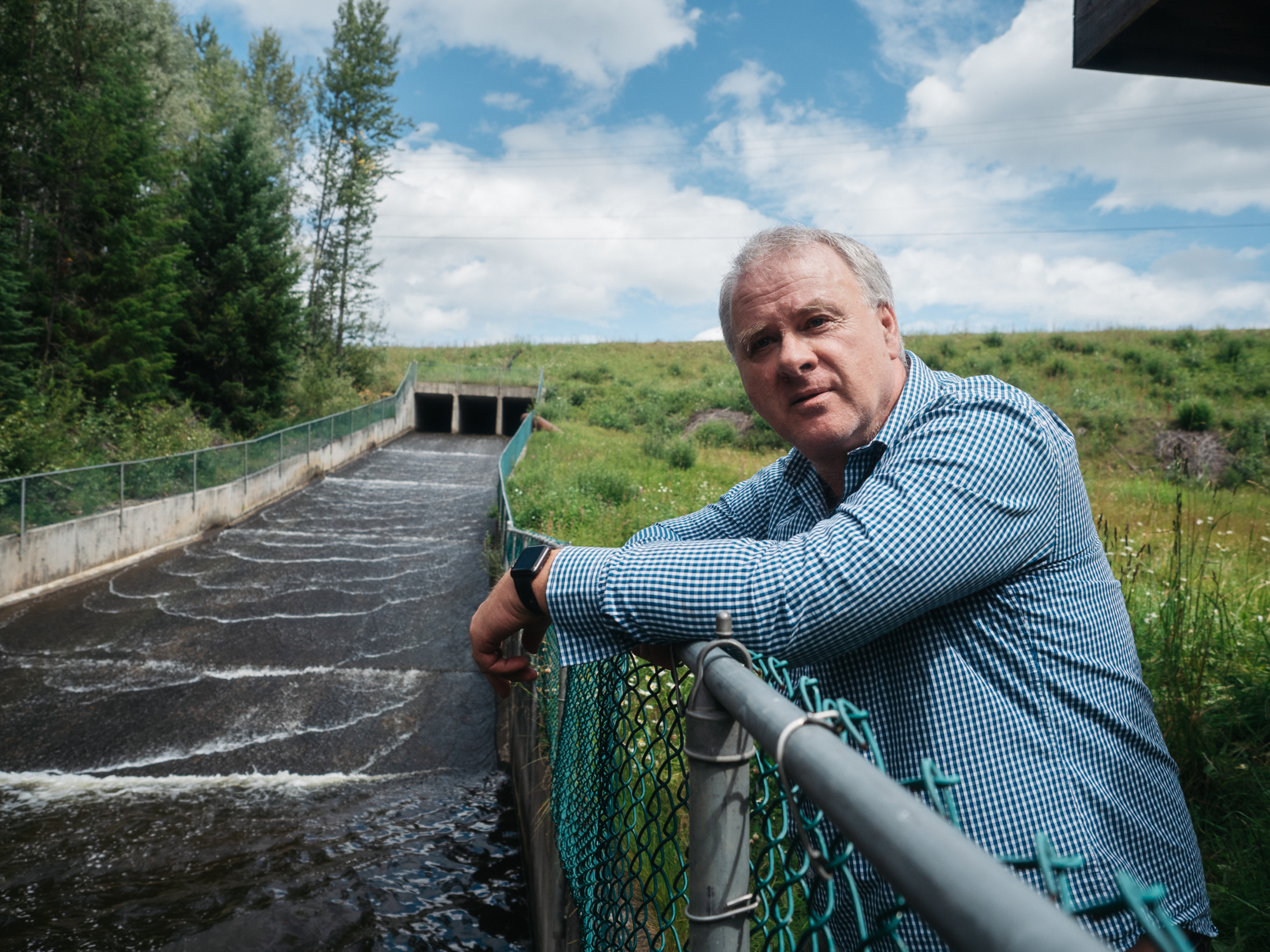
Ron Williams, owner of Morehead Valley Hydro Inc., stands near the spillway of a small-scale hydro facility on the west end of Morehead Lake near Likely, B.C. Williams was dropped as an independent power producer by BC Hydro earlier this year and now faces the prospect of selling his plant for scrap metal prices after investing an estimated $320,000 on the system he built by hand in the late 1980s. Photo: Louis Bockner / The Narwhal
Williams built two small powerhouses and strung up five kilometres of power lines. He used some of the energy to power his home and sold the bulk — enough to power 40 to 50 homes annually and 100 homes at peak production — to BC Hydro.
But last December, after almost 30 years in business, Williams’ investment and dreams came crashing down. He says BC Hydro staff phoned him to say his energy purchase agreement (EPA) had been terminated.
“They never wanted to put anything in writing,” he explained. “They always wanted to just talk on the phone. And they told me over the phone that they had been instructed by their political masters that there would be no new contract.”
“Now I have this small renewable energy project and assets in a creek that are worthless.”
Williams is one of the long-time hydro producers The Narwhal spoke to during an investigation into small, green power projects, all of them family-run, that have recently been cut off from supplying energy to the BC Hydro grid.
Our investigation found these “mom and pop” producers were earning considerably less for their power than the average $100-per-megawatt-hour cited by Energy Minister Michelle Mungall last February as a justification for
not renewing contracts with independent power producers (IPPs).
Even before Mungall’s announcement, however, owners of small, green hydro projects say they were caught up in changing rules at BC Hydro that made it increasingly financially onerous for the “little guy” producers once encouraged by the public utility to continue operating.
The end result is that installed clean and green energy in the province is now going to waste — the same power the B.C. government and BC Hydro courted in the 1980s and 1990s, supported for decades and publicly praised.
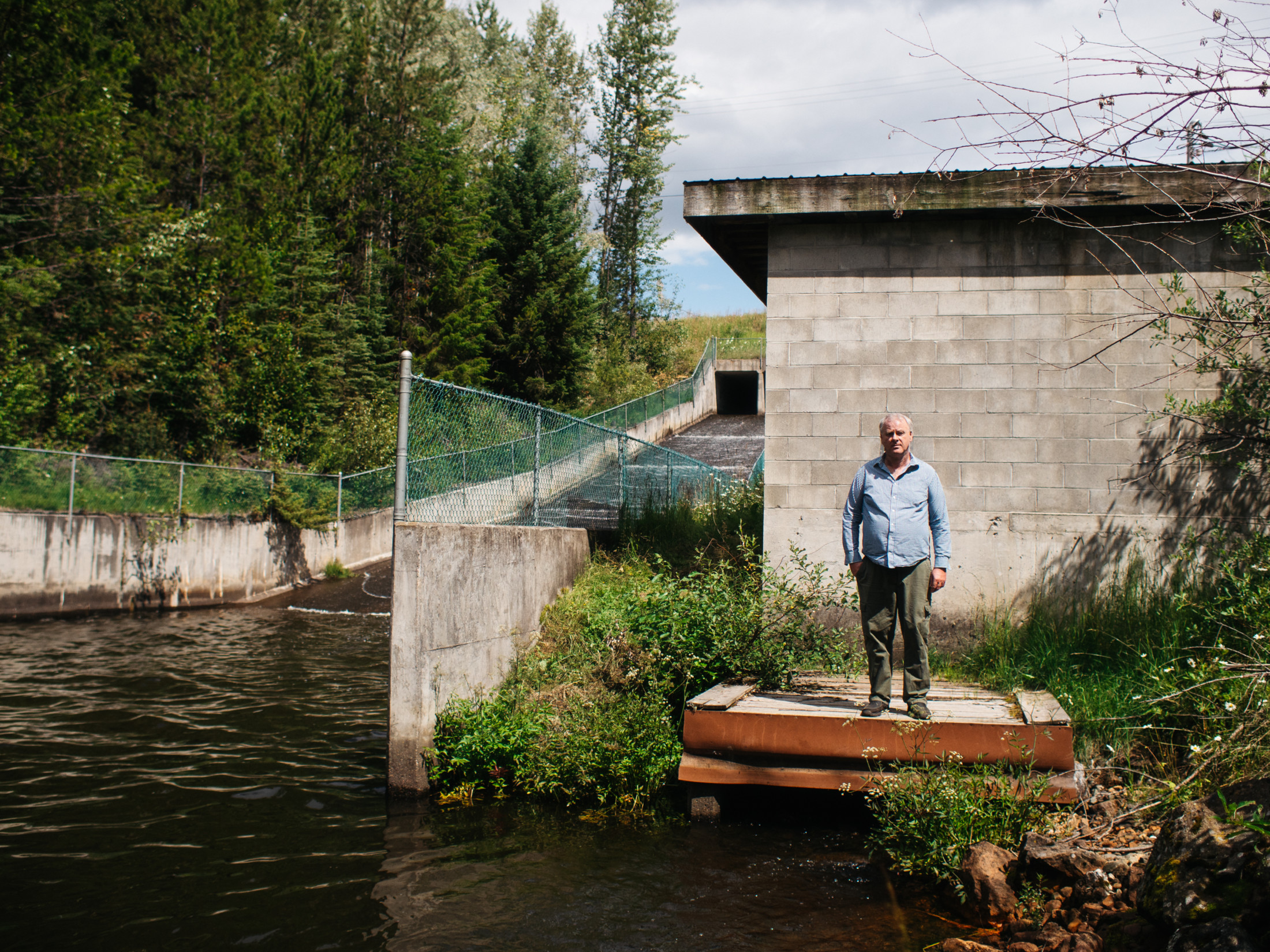
Williams outside his powerhouse. Williams, a retired environmental consultant, claims his micro-hydro system has enhanced the ecology of Morehead Creek because he is able to regulate the flow of water year-round, resulting in an increased number of fish returning to the area. Photo: Louis Bockner / The Narwhal
Just two years ago, for instance, BC Hydro told the B.C. Utilities Commission that the independent power industry has provided B.C. “with a broad range of clean resources and is increasingly expected to deliver those resources on a cost-effective basis.”
Now, after decades of supplying power to the BC Hydro grid, the small producers face financial uncertainty and, in some cases, even bankruptcy.
“The bills will keep coming,” says Jeff Ankenman, owner of a micro hydro project on the Seatton Creek, near New Denver. “I don’t know what we’re going to do.”
“Our plant is in its prime; it will go for another 100 years … I’m broken-hearted.”
Martin Mullany, interim executive director of Clean Energy BC, says the recent cancellation of “home-grown clean projects that have been operating for decades” is part of a “deeply concerning” trend.
That trend includes the on-going review of BC Hydro’s net metering program, which allows homes and businesses to install solar and sell excess electricity to the BC Hydro grid.
BC Hydro now wants to change the rules so it no longer buys excess electricity from new solar installations, Mullany points out, unlike other utility companies in Canada and around the world that purchase such power.
He also notes that BC Hydro’s marketing and trading subsidiary, Powerex, sells B.C.’s clean electricity to Alberta and U.S. states and buys lower-priced electricity from the same jurisdictions.
As a result, some of the power used by British Columbians — when they flick on their lights or charge an electric car — comes from gas and coal-fired electricity in the U.S. and Alberta.
BC Hydro lacks an appetite for green electricity. That’s hurting this historic family-run plant
“So rather than buy competitively priced power from an existing clean, green B.C. facility, BC Hydro has decided it is better to import cheap brown power from the States or Alberta,” says Mullany, a director and CEO of the company Bridge Power, whose interests include five major wind farm projects in B.C.
“If we’re following the spirit of CleanBC, we should not be importing any gas power from outside of B.C. We’re saying to everybody in B.C. ‘fuel switch, reduce your GHG emissions, be super clean, be super environmentally sound, etcetera, but by the way we’ll buy power from the U.S. because it’s cheap [and] we don’t care whether it’s gas driven or not.’ ”
“That’s not a consistent message.”
Mullany also points out that BC Hydro cancelled its Standing Offer Program, which provided independent power companies and communities, including First Nations, with an opportunity to develop small-scale renewable energy projects.
For 21 years, Ankenman and his partner Sue McMurtrie ran the micro hydro project they built on a creek at a site previously disturbed by a railway and highway.
Ankenman describes it as a “labour of love.”
“We built it by hand,” Ankenman explains. “We poured all the concrete by hand, mixed it in a little mixer. I welded every piece of pipe. We planted the poles. We hung the transformers … the whole community helped us build that project.”
The couple were so intent on doing things right that they garnered letters of support from three local village councils, the local chamber of commerce, the West Kootenay Touring Society, the Valhalla Wilderness Society, the Sinixt Nation and the Arrow Lakes Indian band.
Everybody likes the “little ma and pa guys,” Ankenman says.
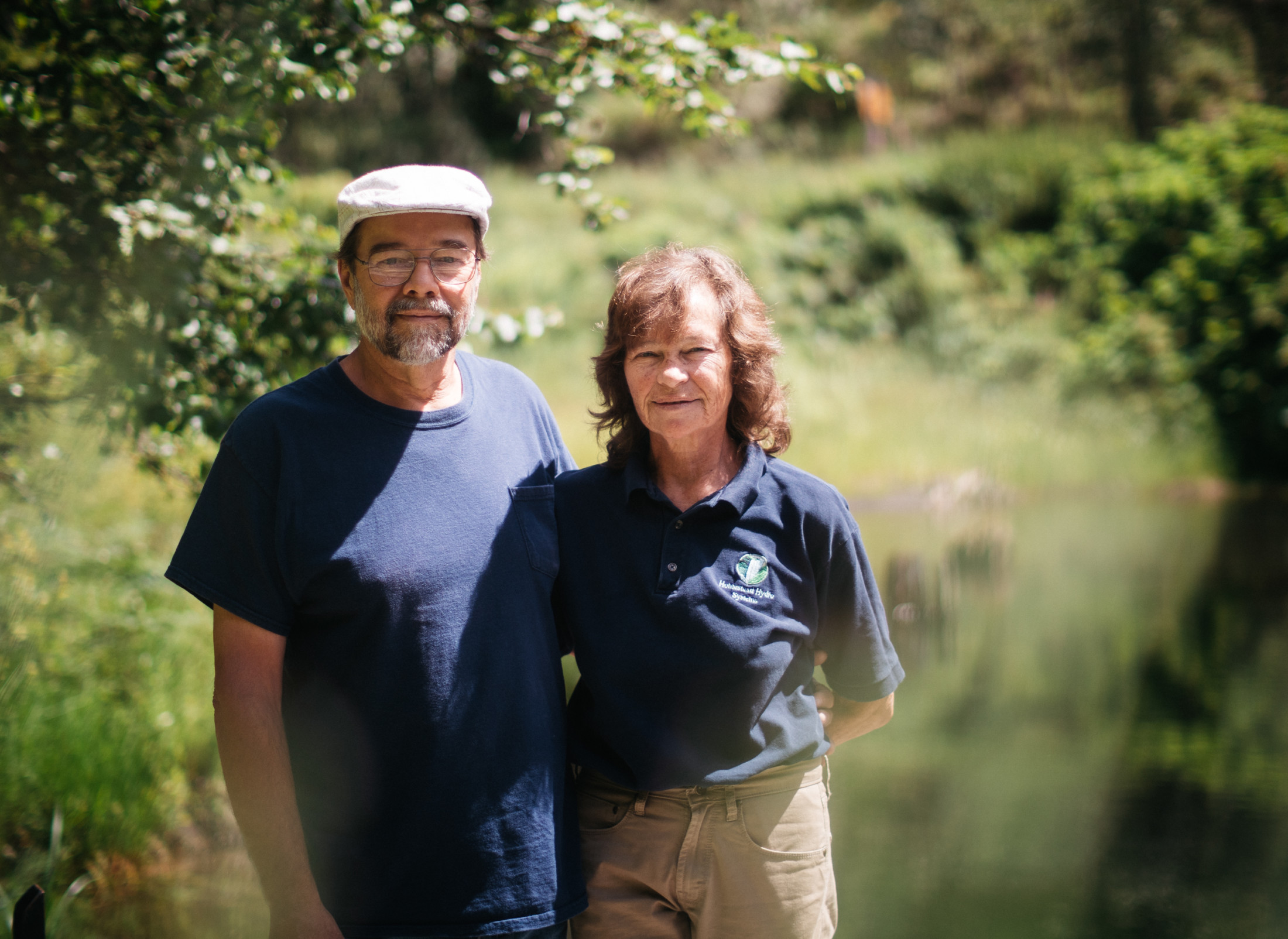
Ankenman and McMurtrie at their Homestead Hydro Systems plant. Photo: Louis Bockner / The Narwhal
After borrowing $250,000 to pay for the project, in 1997 the couple signed a 20-year energy purchase agreement with BC Hydro that had an auto-renewal clause.
“Basically, our contract goes until Hydro cancels it,” Ankenman explains.
BC Hydro agreed to buy up to 200 kilowatts in capacity for $45.60 per megawatt hour, plus three per cent inflation per year, Ankenman says.
By November 2018, the last month BC Hydro paid them for the power, Ankenman says they were earning $84.86 per megawatt hour before annual expenses of more than $5,600 for insurance, property taxes and water license rentals and fees.
The couple must continue paying all of those fees — with the exception of about $1,000 for annual water rentals — even though they’re earning nothing now.
“So for the last 20 years we do our thing and we generate power and our plant runs flawlessly,” Ankenman says. “I’m on top of it. This is my thing.”
During the three-months spring freshet, Ankenman slept in a makeshift 8 by 12 cabin by the powerhouse, setting an alarm every four hours to make sure trash racks weren’t clogged.
He even installed an auto dialler for the winter months that would call him if the plant stopped running for any reason. He also invented a device to monitor the plant by telephone from his home.
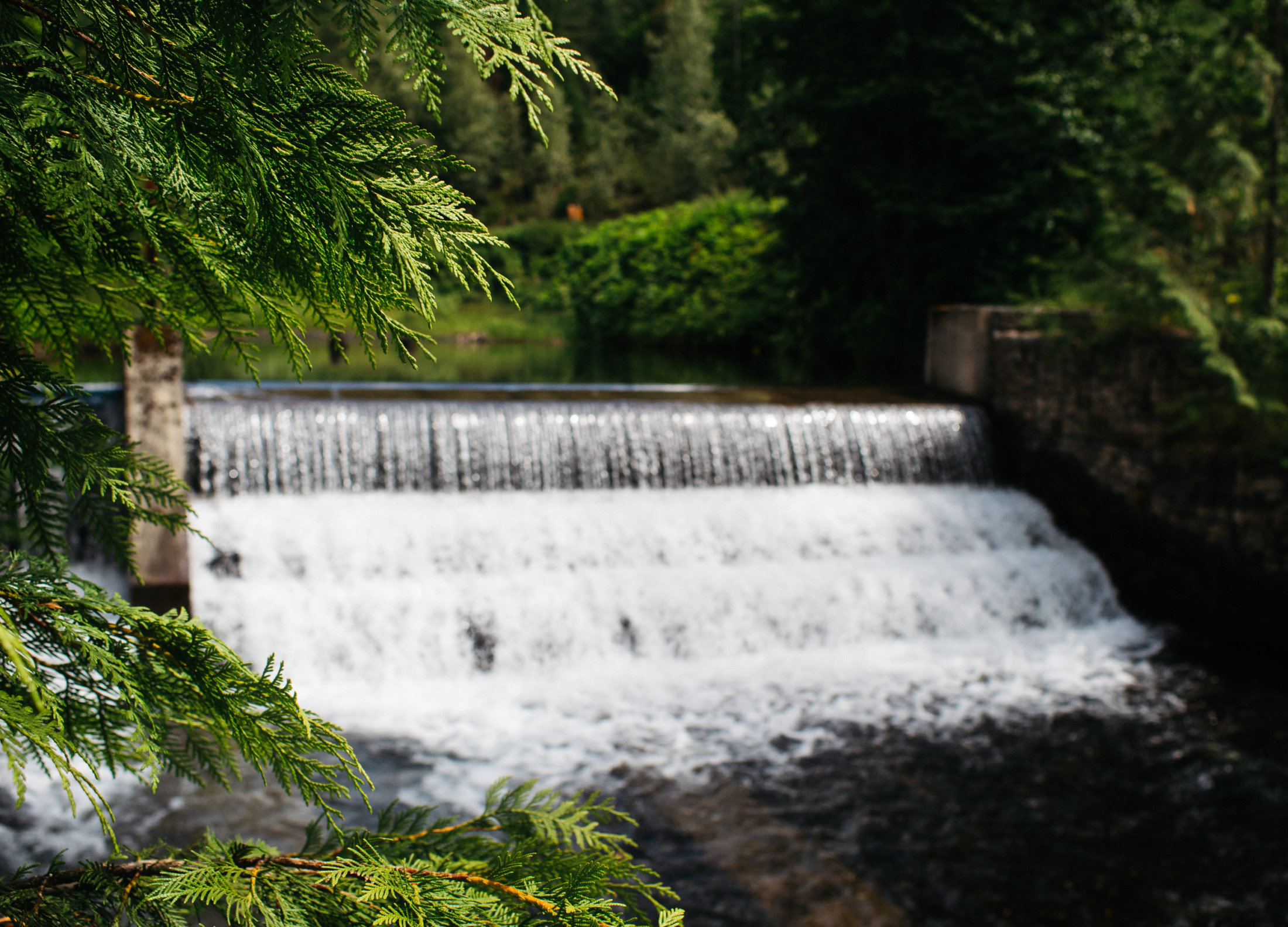
The Homestead Hydro Systems’ dam was built on a disturbed site where the highway from Kaslo to New Denver was once located. Owners Sue McMurtrie and Jeff Ankenman built it by hand, often using local materials, before bringing it online in 1997. Photo: Louis Bockner / The Narwhal
“I can phone the plant and I can hear the turbines running and I get a tone signal that tells me how much water is in the head pond,” Ankenman explains.
Once his contract extension with BC Hydro expired in August 2018 and payments stopped at the end of November last year, the plant sent electricity into the BC Hydro grid for free, Ankenman says.
Five months later, he switched off the three turbines to take some time to consider the couple’s options, including an offer to buy the plant from someone who wants to mine mining cryptocurrency,” which Ankenman says “does not interest us.”
Decommissioning, Ankenman says, is not an option. “This has been my life’s work. I don’t think I’d have the emotional strength to tear it apart. I expected it would generate long, long, long after I’m gone.”
Aimee Watson, board chair of the Regional District of Central Kootenay, says B.C. needs to approach energy security “the same way we do food security,” with localized power grids that ensure remote and rural communities are not left without electricity for days due to extreme weather events that down power lines further away.
In late November, some Lardeau Valley communities were without power for 29 hours when a tree fell on a power line and landlines died after two hours in areas without cell phone coverage, Watson notes.
“Our grid is extremely unstable in our remote communities.”
Watson says the 24 communities in the central Kootenay area she represents could become self-reliant for electricity by using creek power, solar power and generating power from hog fuel, or waste wood. But current regulations and BC Hydro’s monopoly on power don’t allow that.
The region has a “huge potential” to be energy independent if it produces its own power, she says. “As an elected official it’s very much top of my mind when it comes to sustainability, community safety, economic development. They’re major barriers that all relate to our power instability. It’s a hot topic for us.”
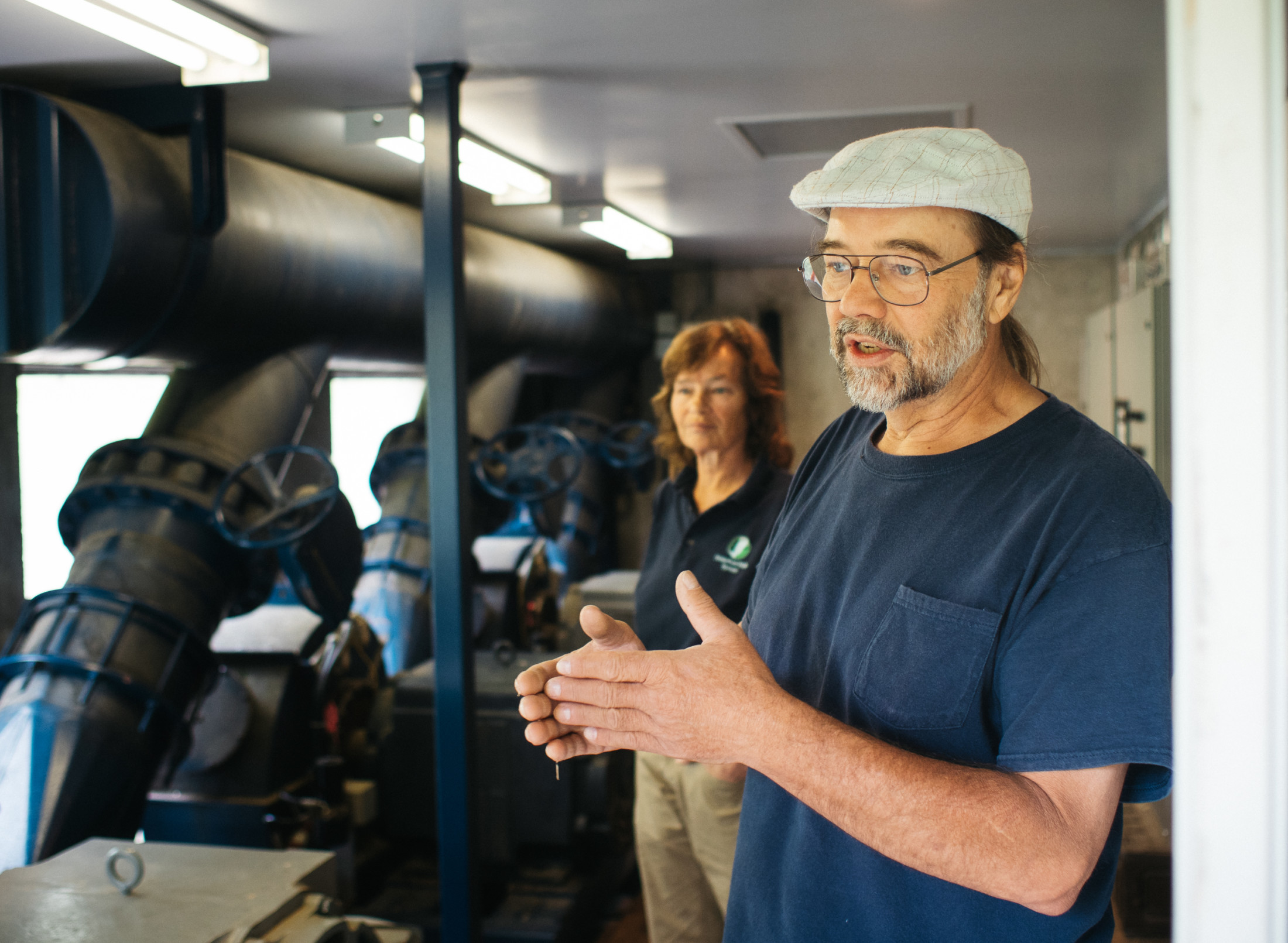
Ankenman and McMurtrie stand inside the Homestead Hydro System’s powerhouse, which is now offline. Ankenman expressed his disappointment after making the decision to switch off three turbines at the plant. “I expected it would generate long, long, long after I’m gone,” he says. Photo: Louis Bockner / The Narwhal
“The monopoly being created means we are lynched in remote areas from being self-sustainable even though we could provide our own power with a much smaller ecological footprint than the massive dams.”
B.C. needs to look “several steps beyond” decarbonizing its economy and find solutions that work for rural and remote communities as well as for urban centres, Watson says. For instance, in the absence of reliable power, she notes that people in rural and remote communities depend on wood stoves for heating, creating carbon emissions.
“If you localize the energy you’re actually making it viable for green energy to be sustainable, and not just for the urban centres.”
When Williams heard from BC Hydro that his contract would not be renewed, he wrote to Mungall to express his dismay. He told her that BC Hydro had strung him along since 2014, saying they would get to his contract after they negotiated seven or eight other contracts that were also up for renewal and asking him to be patient.
“So, because of that delay, I got caught in the NDP decision to halt the IPP program now, and worse, I think I am being utilized as the first IPP to not be renewed — to show the IPP community and the province that future IPPs will not be renewed or if they are it will be for a much lower price,” Williams says in an interview.
“So my tiny micro hydro project, which should have never really been in a large scale contract [energy purchase agreement] renewal, is being sacrificed by this turn of events, because I accepted BC Hydro at their word that they would deal with me in good faith.”
Williams says he never heard back from Mungall.
But on January 9 he received a letter from her assistant deputy energy minister, Les MacLaren, confirming his energy purchase agreement (EPA) with BC Hydro would not be renewed.
“BC Hydro currently generates or purchases more clean energy than its customers use, and exports the surplus to other jurisdictions,” MacLaren wrote by way of explanation in the letter, which Williams shared with The Narwhal.
“I am sorry to hear that this decision places you in a very difficult position and acknowledge your contribution, and that of Morehead Valley Hydro, to providing the province with clean energy.”
William’s MLA Coralee Oakes (Cariboo North) went to bat for her constituent, also voicing her concerns in a letter to Mungall.
“With your changes to policy in 2018 to no longer buy back additional electricity from any private company, this has left this company Morehead Valley Hydro Inc., to face bankruptcy,” wrote Oakes, in a letter Williams shared with The Narwhal.
“I am asking that you reconsider your policy and to continue to buy back renewable electricity from private companies, and that you allow BC Hydro to once again sign a contract with Morehead Valley Hydro Inc.”
“I didn’t cause them any major issue,” Williams says. “I’ve had a good relationship with them for 25 years. I’ve had no problem. They treated me excellent. And then out of the blue they just say ‘good-bye.’ ”
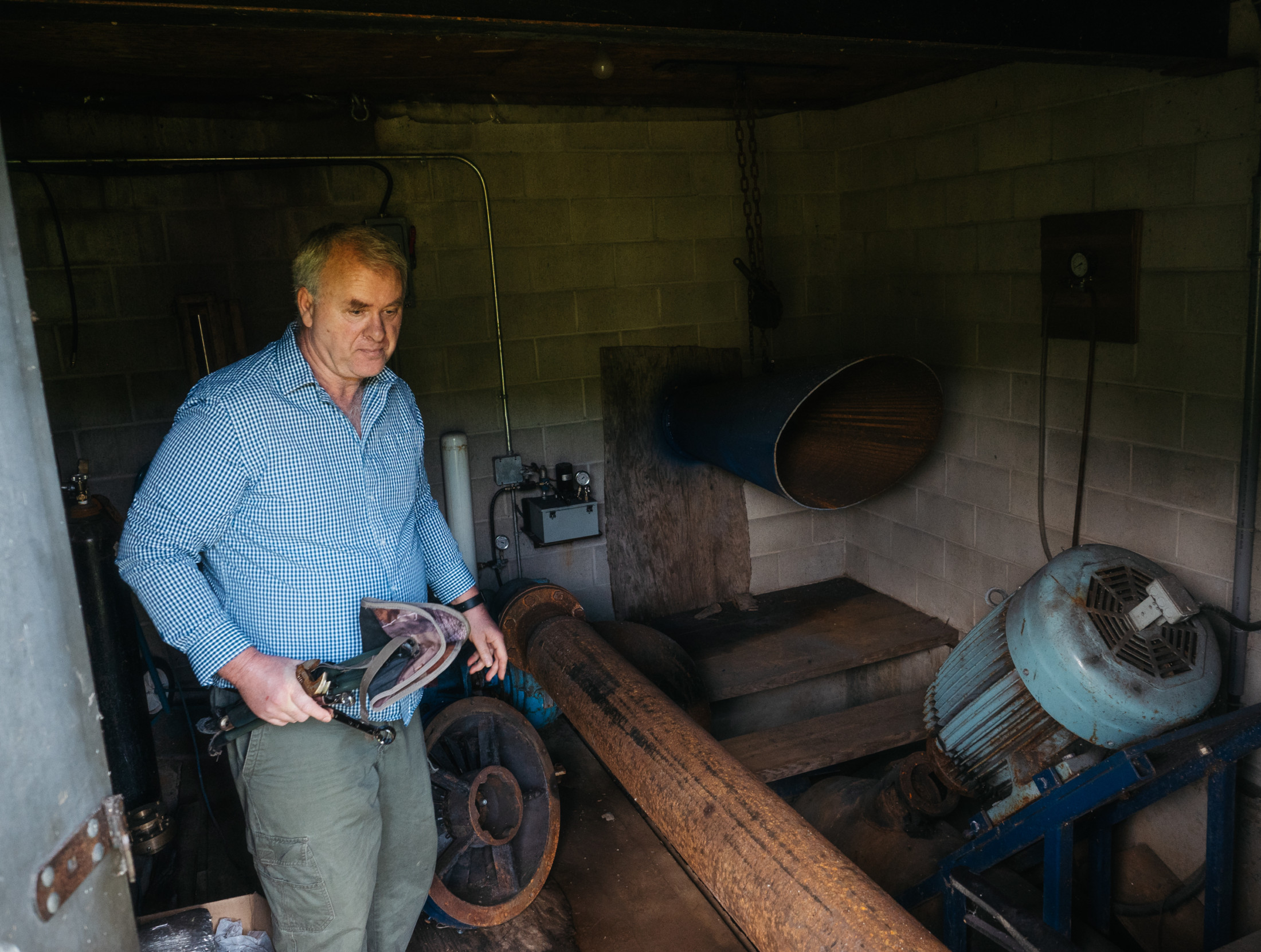
Williams, owner of Morehead Valley Hydro Inc., collects tools from his powerhouse that has been online since 1990. After selling power to BC Hydro for almost 30 years his contract expired four years ago and BC Hydro officially stopped buying power from Morehead in early 2019. Photo: Louis Bockner / The Narwhal
“At my first site I’m just diverting the water through the turbine and not generating electricity, that’s just to keep enough water for fisheries flows. And the water is spilling over the dam, so basically the water’s now going back through the spillway.”
Williams said he earned $38 per megawatt hour when he first began supplying power to the BC grid 25 years ago.
By last December he says he was receiving almost $85 per megawatt hour.
Although small producers have been told B.C. no longer needs their power, BC Hydro recently asked the B.C. Utilities Commission for 40-year contract renewals for three large independent power projects on the grounds that the province requires their electricity.
The amount of money BC Hydro pays those large producers is not public.
On November 8, the B.C. Utilities Commission (BCUC), an independent watchdog that looks out for the public interest, turned down BC Hydro’s request. Instead, it granted the three large projects permission to continue supplying power to the grid for three more years, until BC Hydro releases its long-term plan to meet energy demand, called an Integrated Resource Plan.
“Once that plan comes out, they will see if the power is required under that,” Mullany says.
“Reading between the lines it might be the BCUC saying ‘we need consistent messaging. Either you’re in excess or you’re not.’ ”
“If they want to buy something, they [BC Hydro] have a shortfall. And if they don’t want to buy something they have an excess. Which is it?”
In response to questions from The Narwhal, BC Hydro sent a general statement saying it is renewing contracts with IPPs “at prices less than what they would have been paid under the original contracts, recognizing that these have typically recovered most of their capital costs over their original contract terms.”
“As agreements approach their expiry date, BC Hydro considers factors such as the need and cost-effectiveness of energy, the quality of energy product and non-energy benefits,” the statement said, noting that the average price for IPP power is more than $100 megawatts per hour, which is “higher than market rates.”
BC Hydro did not answer questions about the family-run IPP projects. Nor did it answer a question asking why it does not pay a consistent price for IPP power.
Ankenman said problems began for his project under the previous BC Liberal government, about five years before the NDP’s announcement that contracts with independent energy producers would not be renewed.
In 2012, as the provincial government moved ahead with plans to build the Site C dam, Ankenman says he was asked to join a BC Hydro webinar.
There he learned BC Hydro would not be continuing purchase agreements under the auto renewal option and was changing the rules for the [then still functioning] standing offer program “so that only new projects would be eligible.”
“We wouldn’t be,” Ankenman says.
BC Hydro also announced a process for renewing their contract that Ankenman describes as “just horrendous.”
To newly qualify to provide power — the same power they had supplied for two decades to the BC Hydro grid — Ankenman says they were told they must have a gap review, which included hiring an engineer to assess their plant, for a total cost Ankenman pegged at about $20,000.
Then BC Hydro would charge them a deposit of $5,000, with the final cost to be determined, just to review their application.
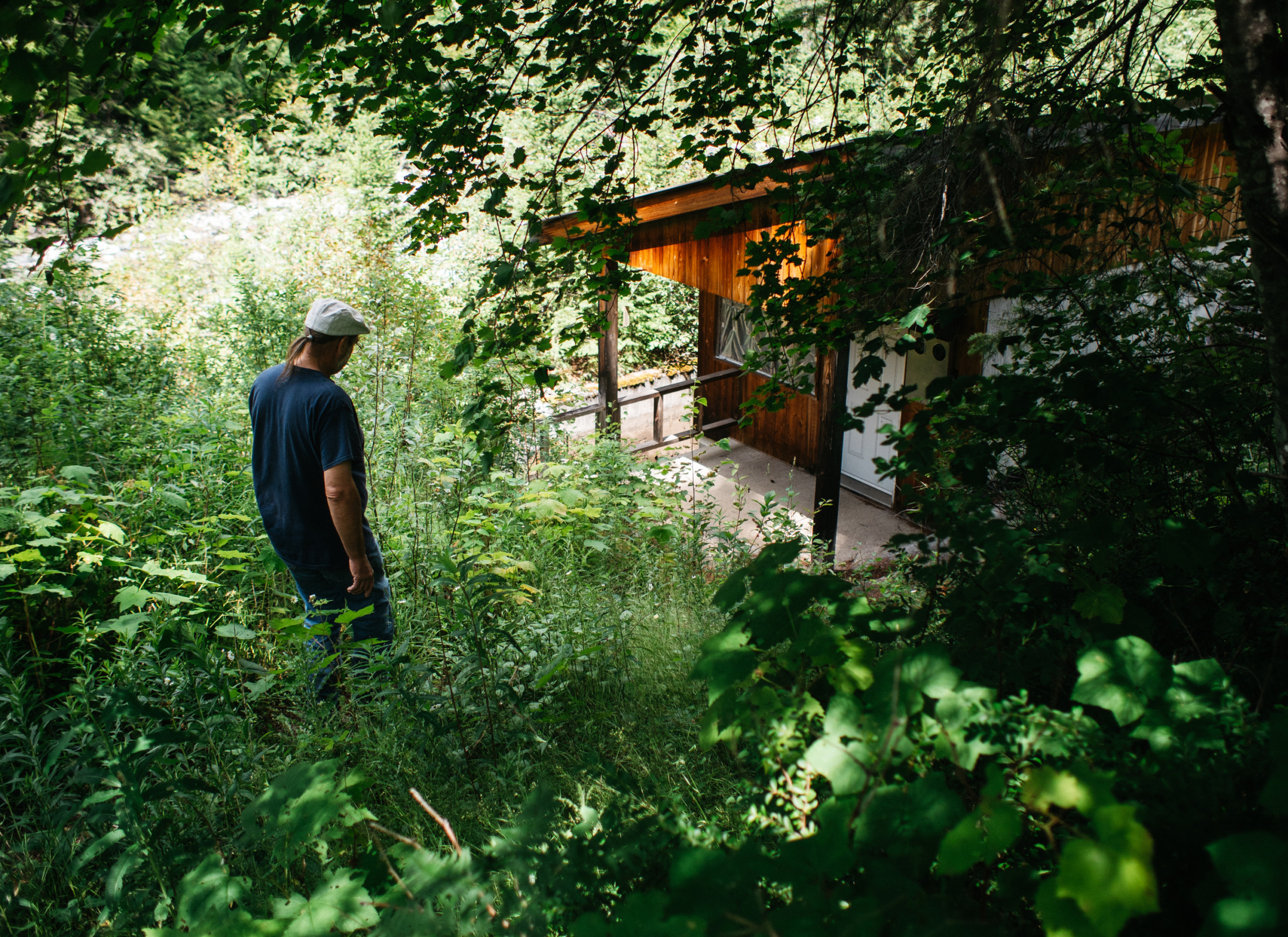
Jeff Ankenman walks down to the power house of Homestead Hydro Systems. Powering his community with green electricity has been his life’s work and a labour of love, he says. Photo: Louis Bockner / The Narwhal
Additionally, Ankenman says a BC Hydro representative told them they would have to settle for less money and they would have to sign a confidentiality agreement.
“She emailed it to us and it’s a big long thing with legal language that I don’t understand,” Ankenman says. “But what I gather from it is that we’re not allowed to talk about the price, we’re not allowed to talk about the technology and we’re not allowed to talk about the process.”
He says he is offended by the confidentiality agreement.
“The people of B.C. have the right to know how much BC Hydro is paying for power. This is nonsense to have all this stuff secret.”
BC Hydro did not respond to a question about why the rules changed for IPPs.
BC Hydro also did not answer a question asking whether it is considering allowing the family-run IPPs to become part of the net metering program, which Williams says they were told was one option to keep them in business.
Glenn McDonald is in a similar predicament. His father negotiated a contract with BC Hydro in the 1980s to supply power from two generating stations he built on streams on the family’s cattle ranch in Grasmere, south of Elko and close to the U.S. border.
McDonald says he was “astounded” to hear on the radio in February — in a news story about the NDP government’s Zapped report criticizing independent power production — that he was being overpaid.
He says he earned $60 per megawatt hour for supplying power to BC Hydro, about $3,500 a month before his 25-year contract ended last year, and before expenses.
The ranch is capable of supplying three times as much power to BC Hydro for 16 hours each day, McDonald points out.
One-seventh of the 350 kilowatts of power they produce is for domestic use, with the bulk of it running a small sawmill for eight hours a day. But the rest of that installed power could go into the BC Hydro grid, he says.
The NDP government “is not telling the whole story” when it says run of river projects supply power during the spring freshets, just when BC Hydro doesn’t need any more power in the system, according to McDonald.
By using IPP power, BC Hydro could fill up reservoirs like the Williston Reservoir that haven’t been filled in recent years because of low water flow, McDonald says. The reservoirs would then have additional capacity — if, indeed, any is needed — to supply power during times of heavy use, such as during cold snaps and heat waves.
“I can’t say they’re telling lies but they’re not telling the whole truth.”
Small, family run power projects are an “easy scapegoat,” McDonald says, because they don’t have deep pockets necessary to challenge BC Hydro.
McDonald says he hasn’t followed up with BC Hydro because he’s been too busy running the ranch and doesn’t have the money for a legal battle. His small power plant is in need of repair, but he can’t fix it without the financial security of a contract.
So his extra power just “runs down the creek.”
Williams, who continues to receive bills from the B.C. government for power project charges such as property tax, land lease and water licences, says he’s contacted the B.C. Ombudsperson’s office to see if there is any recourse.
Cutting out the smallest IPPs while renewing other IPP contracts smacks of unjust treatment, Williams says.
“This is why I assume I still have a foot in door regarding some type of appeal, just based on fundamental unfairness.”
Get the inside scoop on The Narwhal’s environment and climate reporting by signing up for our free newsletter. On March 17, federal Conservative Leader Pierre Poilievre...
Continue reading
Racing against time, dwindling habitat and warming waters, scientists are trying to give this little-known...

From investigative reporting to stunning photography, we’ve been recognized with four 2024 CAJ Awards nods...

The Narwhal is expanding its reach on video platforms like YouTube and TikTok. First up?...
